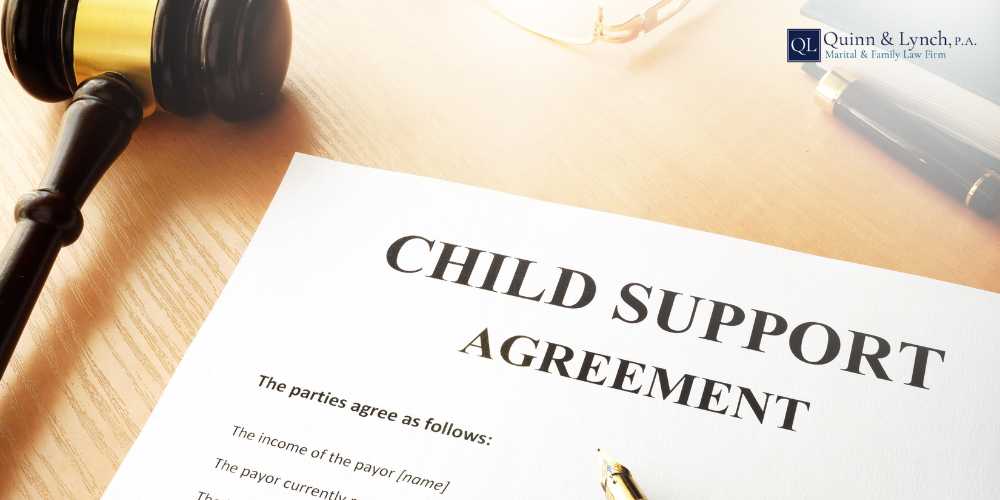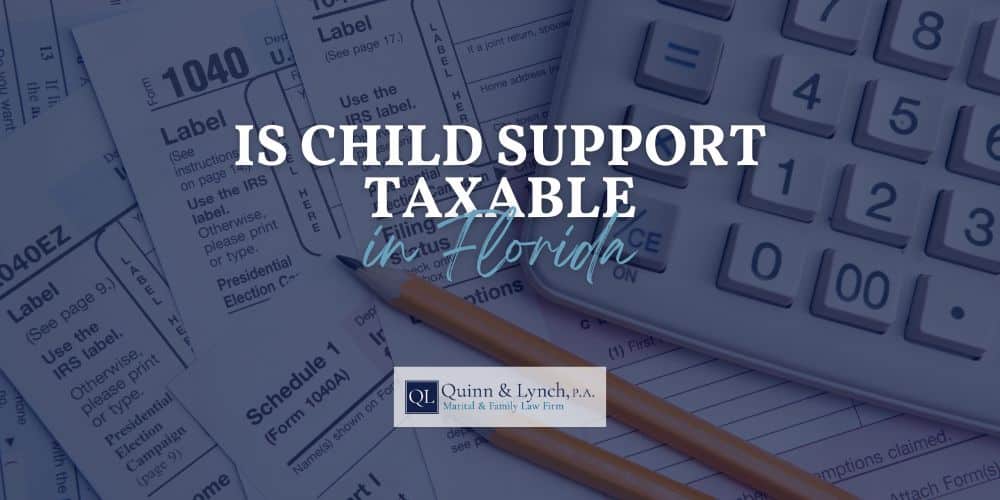To answer, “Is child support taxable?”, child support payments are not considered taxable income for the receiving parent, nor are they tax deductible for the paying parent.
When handling your tax return, it’s crucial to understand that payments made under a court order do not need to be reported as income. This means that the receiving party of child support does not claim child support payments as taxable income, and the paying party cannot deduct them on his or her tax return.
If you have questions about the tax implications of Florida child support payments, especially during tax season, consulting with an experienced Tampa family law attorney can offer clarity and peace of mind. Contact Quinn & Lynch, P.A. to ensure you make the right decisions regarding child support payments and filing taxes for your child and yourself.
Call 813-223-7739 or contact us online to schedule a consultation today.
How Does Child Support Affect Your Tax Return?
Child support is considered tax-neutral, meaning it is neither taxable income for the receiving party nor deductible for the parent paying. This distinguishes child support from alimony payments, which may have different tax implications under IRS guidelines.
So, who claims the child on taxes with 50/50 custody in Florida?
According to current tax laws, only one parent—the receiving party of the child support (and usually the party claiming the child as a dependent)—benefits from the income to assist with child expenses, yet parents do not need to report this income when they file their tax return.
Is Child Support Taxable Income?
Child support payments received by a parent are not considered income for tax purposes.
Under current tax laws, the money provided through a child support order does not count towards gross income nor offers any tax benefits on his or her tax return. This means that child support is not included in the total amount of your earned income and does not affect your eligibility for tax credits such as the Earned Income Credit.
The IRS understands that those paying child support are doing so solely for the child’s support and ensures no impact on taxes.

Are Child Support Payments Tax Deductible?
Child support payments are not tax deductible for the paying party.
Regardless of the amount a non-custodial parent must pay under a court order to support their children, child support payments cannot be deducted from their taxes.
This rule applies uniformly to everyone paying child support, ensuring that the financial responsibility directed towards the care and support of a child remains a personal obligation of the paying parent rather than one that offers tax relief.
Tax Planning for the Custodial Parent
As a general rule, the custodial parent, who maintains primary custody of the child, can claim the child as a dependent on their tax return.
Holding primary custody means that the parent usually has the right to receive specific tax benefits that come with listing a child as a dependent. This includes potential credits and deductions recognized by the IRS, which can significantly impact the overall tax liability.
Receiving child support does not alter the custodial parent’s ability to claim the child as a dependent, ensuring continued access to these tax advantages.
IRS Form 8332
IRS Form 8332 is a crucial tax document for divorced or separated parents. It allows the custodial parent to release their right to claim a child as a dependent to the non-custodial parent. This form enables the non-custodial parent to claim the child on their tax return, providing they meet other IRS stipulations for claiming a dependent.
The custodial parent must complete and sign the document indicating they agree to allow the other parent to claim the child on his or her taxes.
Both parents can arrange their tax obligations and benefits using this form to suit their financial situations best.
Child and Dependent Care Tax Credit
The Child and Dependent Care Tax Credit is designed to assist parents who spend money on child care while they work or look for work.
To qualify for the Child and Dependent Care Tax Credit, custodial parents must have paid for care services for children under 13 and earned income from a job or self-employment. This credit is significant because it can directly reduce the amount of taxes owed, not just taxable income.
To claim this credit, custodial parents must care for the children for more than half of the year and file as the primary caregiver on their taxes.
It’s crucial that the other party, usually the non-custodial parent, acknowledges these expenses in any agreements, as only one parent can claim the credit in a given tax year.

How a Tampa Child Support Lawyer Can Help
An experienced Tampa child support lawyer can provide invaluable assistance, well above answering questions such as “Is child support taxable?” Our Tampa child support lawyers offer legal assistance tailored to your specific situation, ensuring your child support arrangements are fair and comply with Florida law.
Whether establishing a new child support order, modifying an existing one, or facing Tampa child support enforcement issues, a skilled family law attorney at Quinn & Lynch, P.A. will advocate for you and your child, ensuring the support meets your child’s needs.
If you need legal guidance or representation regarding child support in Tampa, Florida, call 813-223-7739 or contact us online to discuss your case with a dedicated family law attorney who understands the nuances of Florida’s child support laws.













